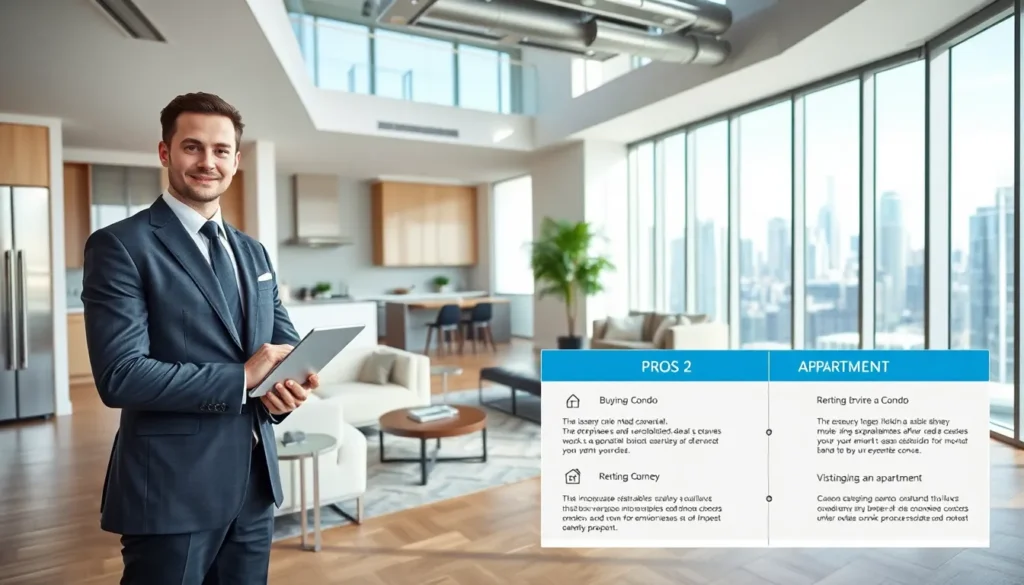Table of Contents
ToggleIn the grand debate of real estate, buying a condo versus renting an apartment often feels like deciding between pizza and tacos. Both have their merits, but which one truly satisfies? If you’re contemplating your next home sweet home, this guide will serve up the facts, seasoned with a dash of humor and a sprinkle of wisdom. So sit back, maybe grab a snack, and let’s jump into the quirks of condo ownership and apartment renting. Spoiler alert: There’s no one-size-fits-all answer.
Understanding Your Living Situation

Choosing between a condo and an apartment can often feel overwhelming. It really starts with understanding your unique living situation. Think about lifestyle preferences, professional obligations, and personal goals. Is a busy urban lifestyle calling your name, or does the tranquility of the suburbs beckon? Condos often attract individuals looking for a blend of ownership and community. They give a taste of settling down without the yard work of a single-family home. Apartments, on the other hand, can be more flexible, which is ideal for those who anticipate changes in their living situation. Plus, you won’t be sweating the exterior maintenance or repairs: that’s the landlord’s job.
At the end of the day, it’s about matching your living arrangement to your life’s stage. So, whether it’s planting roots or keeping things transient, knowing where you stand is the first step.
Financial Considerations
Now, let’s talk dollars and cents, everyone’s favorite part. When considering buying a condo versus renting an apartment, the financial implications can be substantial. Buying usually involves a hefty down payment, closing costs, and ongoing expenses like property taxes and homeowners association (HOA) fees. On the flip side, renting typically requires just the first month’s rent and a security deposit.
Condo ownership can often lead to building equity over time, which means that your investment might pay off in the long run. But, the initial financial outlay can be daunting. Also, fluctuations in property value can add an element of uncertainty. Renting might free up cash flow for other investments or savings goals, potentially letting someone take daring vacations or hobby classes instead of paying a mortgage.
Eventually, the financial landscape should be a key factor in the decision-making process, analyzing current budgetary constraints and future financial goals can illuminate the best path.
Long-Term Vs Short-Term Commitment
When embarking on the condo versus apartment journey, commitment is key. A condo purchase is a long-term dedication, think years, not months. Homeownership typically comes with a sense of stability, which is perfect for those who are ready to settle down. This may be ideal for families or those whose careers are anchored in a single location.
Renting an apartment, but, is like dating instead of marrying, easy to dip in and out of while providing flexibility to change locations without much hassle. For professionals who move frequently or students navigating through their academic tracks, renting can make much more sense. Consider how long one intends to stay in the same place when weighing the options. Commitment level can be a game changer.
Lifestyle Factors
Regardless of finances, lifestyle plays a crucial role in deciding between a condo and an apartment. Looking for communal amenities like pools, gyms, and community events? Condos often shine in this department. They provide a sense of belonging among neighbors and potential networking opportunities.
On the other hand, apartments can lead to less commitment towards upkeep while still enjoying the perks offered by the building. Think about lifestyle priorities, are you someone who enjoys hosting big brunches, or do you prefer cozy nights in? The layout and size of the home should cater to how you want to live. Also, factors such as proximity to work, schools, and recreational spots will influence the choice. Lifestyles are as diverse as the options available.
Market Conditions and Timing
Market conditions can significantly influence the decision to buy a condo versus rent an apartment. When interest rates are low, it can be an excellent time to purchase. But, housing markets can be unpredictable, sometimes, prices are too high, or inventory is scarce. If your local market is booming, buying might feel like jumping into a feeding frenzy. Conversely, if it’s a buyer’s market, seizing the opportunity could lead to a favorable investment.
Renting an apartment also depends on market dynamics. Some regions might offer new apartment complexes with attractive incentives like reduced rent for the first year. Understanding the local real estate landscape is essential. Gather insights on whether it’s a renters’ or buyers’ market in your area, this knowledge can steer you toward the best opportunity.
Pros And Cons Summary
It can be handy to summarize the key pros and cons of buying a condo versus renting an apartment.
Buying a Condo
Pros:
- Building equity over time
- More control over home modifications
- Community amenities and connections
Cons:
- High upfront costs
- Responsibility for maintenance and repairs
- Less flexibility in terms of relocation
Renting an Apartment
Pros:
- Lower upfront costs and generally less financial risk
- Great flexibility to move easily
- Maintenance often handled by the landlord
Cons:
- No equity is built
- Limited control over changes to the space
- Possible rent increases over time
In this nutshell, weighing the benefits and drawbacks can help align choices with individual priorities and circumstances.




